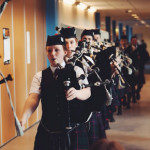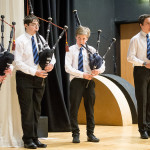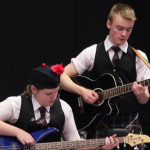Please note, we have updated the rules for the new ‘Junior C’ so that it matches that of ‘Junior A’ and ‘B’ . Those bands competing in the ‘Junior C’ competition may now contain RSPBA-registered members. Further details are below.
The Championships were established in 2013 with the main aims of:
The Championships are for full school or combined schools pipe bands (as opposed to the mini band format normally associated with indoor competitions). The Championships are also open to school pipe bands from outwith Scotland.
The Championships are independently organised by the Scottish Schools Pipes and Drums Trust (SSPDT) but carry the support of the Royal Scottish Pipe Band Association (RSPBA). They are not an RSPBA competition and are not run under RSPBA rules.
There are eight categories, designed to provide a forum for top level competition as well as a positive and encouraging environment for school pipe bands with minimal or no competing experience.
Schools should ensure that they enter into the spirit of the event by selecting carefully the most appropriate category, or grade, in which to take part. Prizes are graded to encourage established bands to be ambitious.
Freestyle entries are eagerly encouraged from all schools, whether they have bands that are RSPBA-registered or not.
Categories below, open to RSPBA-registered schools/bands only:
Categories below, open to schools/bands that are not registered with the RSPBA. These are not open to RSPBA-registered schools/bands.
Freestyle, open for all participants in any of the above categories, and schools/bands are encouraged to take part.
If a school is unable to enter a pipe band due to lack of players, a combined schools pipe band may compete provided that all the players are from schools (primary and/or secondary) within the same education authority.
If a pupil is eligible to play for both a school pipe band as well as a combined schools pipe band, priority should be given to the school pipe band unless the relevant head teacher gives permission to the contrary. A pupil cannot play in both bands.
One adult instructor may play in all categories. In the case of the Freestyle Musical Ensemble category, one adult either as conductor or leader may take part. No other adult players are allowed.
All pupils must be in full time education at their school at the time of The Championships.
No pupil will be allowed to play in more than one of the competing pipe bands or piping quartets.
Players in combined schools pipe bands and piping quartets must attend schools within the same education authority.
All pipe bands and quartets must play in a half circle formation facing the adjudicators. Drummers can be within the half circle along with the pipers or behind the pipers in the half circle.
Pipe bands and piping quartets must submit online in their entry form:
Any changes made prior to the competition must be notified to the organisers.
Closing date for entries is 31 January.
The minimum number of players in each pipe band must comprise:
Bands playing with less than these numbers will be disqualified.
There is no maximum limit of players.
SSPDT supports the development of school pipe bands that can be sustained long term. Pipe bands formed only for the purpose of competing at The Championships with no expectation of continuing are not encouraged.
The pipe band competitions will be judged by RSPBA-approved adjudicators. Where appropriate the adjudication team will be as for RSPBA major championships (i.e. two piping adjudicators, one drumming adjudicator and one ensemble adjudicator). The Quartet Piping and Freestyle Musical Ensemble competitions will be judged by a panel of adjudicators.
Pipe Band Rules & Eligibility Quartet Piping Rules & Eligibility Freestyle Musical Ensemble Rules & Eligibility
 PIPE BANDS
PIPE BANDSFor Novice Juvenile ‘A’ and ‘B’ all tunes must be selected from the list of tunes prescribed on the RSPBA website – www.rspba.org (and may include parts one and two of the four-parted tunes).
School pupils already registered with an RSPBA-registered school or combined schools pipe band may play only with that pipe band (i.e. any school pipe band which includes a player or players registered with the RSPBA must play in either their Juvenile, Novice Juvenile ‘A’ or Novice Juvenile ‘B’ category of registration).
Open only to RSPBA-registered school or combined schools pipe bands in the Juvenile Grade.
Playing requirements:
Open only to RSPBA-registered school or combined schools pipe bands in the Novice Juvenile or Grade 4 ‘A’ Grade.
Playing requirements:
Open only to RSPBA-registered school or combined schools pipe bands in the Novice Juvenile or Grade 4 ‘B’ Grade.
Playing requirements:
Schools/bands that are not registered with RSPBA may choose to compete in any of Junior ‘A’, Junior ‘B’, or Junior ‘C’ that suits their playing ability, keeping in mind that prizes are graded to encourage bands to be ambitious. Junior ‘C’ was introduced for 2024 for inexperienced bands making perhaps their first appearance at a competition, including development bands of schools with other RSPBA-registered players, provided none of its Junior ‘C’ players are RSPBA-registered (except an adult instructor). If schools/bands are unable to form a band, they may enter a maximum of two quartets.
It will be the responsibility of the school/ combined schools to decide the category in which they wish to compete, and, if necessary, to justify to the organisers the reasons for their decision. The organisers retain the right to allocate a band to a different category.
A list of recommended two-parted and four-parted Marches, Strathspeys and Reels is available from the RSPBA website – www.rspba.org – but bands may play other Marches, Strathspeys and Reels of their own choice.
Pipe bands in Junior ‘A’ and Junior ‘B’ and, new for 2025, Junior ‘C’, may include pupils who are registered with RSPBA community pipe bands provided that they comply with the following conditions:
It will be the responsibility of the school/combined schools to decide the category or grade in which they wish to compete, and, if necessary, to justify to the organising committee the reasons for their decision. The organisers retain the right to allocate a band to a different category or grade.
Playing requirements:
Playing requirements:
Four x two-parted 2/4 Marches; or
Two x four-parted 2/4 Marches (all of own choice)
Playing requirements:

Open to schools/pupils strictly under the following circumstances:
Playing requirements:
 FREESTYLE MUSICAL ENSEMBLE COMPETITION
FREESTYLE MUSICAL ENSEMBLE COMPETITIONOpen to all schools or combined schools that have entered other Championships competitions. Whilst a less constrained and more informal category, this event is nevertheless intended to be a serious if somewhat different competition aimed at highlighting the versatility of piping and drumming percussion.
There will be only one category for the event.
Entrants can be:
Each school or combined schools participating in the pipe band or quartet competitions may enter only one concert-style pipe band or musical ensemble.
Choice of music will be entirely up to the school or combined schools concerned, but the piping and drumming element will be expected to be prominent.
Musicianship, harmony, originality, innovation, musical interpretation, presentation, rhythm, musical ensemble and vitality will be important as well as piping/ drumming technical proficiency.
Players
Each Freestyle band must comprise at least six players, and a maximum of 21, of whom at least two must be pipers and one a drummer (not necessarily a pipe band drummer).
One adult only may play either as conductor or leader. No other adult players are allowed.
A maximum of eight minutes to set up is allowed.
A maximum of five minutes playing time is permitted.
Entries are on a first come first served basis, as the intention is that the Freestyle Musical Ensemble competition will run for no more than half the day due to time and accommodation constraints.
Stage Plan
We would like you to submit a stage plan. This should be an approximate drawn ‘picture’ of where your musicians/ instruments will be on stage along with your need for PA equipment. The layout should indicate approximately where you would like microphones and DIs to be placed. The layout should indicate the (approximate) number of musicians.
Technical Basics
Drums
A drum kit will be available, so there is no need to bring your own:
Keyboard
We will also supply a keyboard on stage, which will be a Roland RD600 (or newer equivalent). It has a transpose function. The keyboard will be factory pre-set so, should you choose to use any of the onboard sounds, they will be available. We would encourage you to use this keyboard rather than bring your own.
Your own instruments
You need to bring all your own instruments (e.g. guitars, fiddles), pedals and jack-jack leads with you to the event (less drum kit and keyboard).